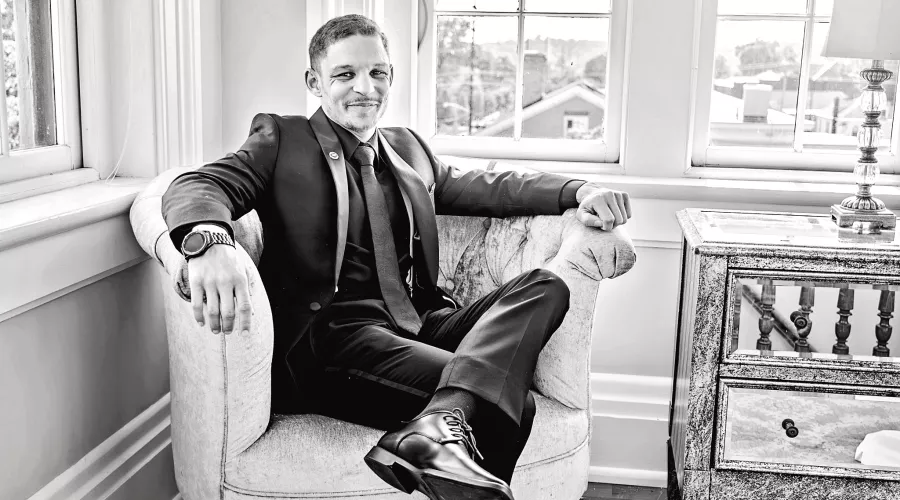Sociology PhD Student Confronts the Barriers of Unhoused Black Men
July 2, 2025
Jon Ellis
By Stephanie Godward, Communications and Marketing Director, College of Arts & Sciences
PhD student Jon Ellis spent nearly a decade moving from state to state without a place to call home; now harnessing his own lived experience and education to research and solve the complex barriers unhoused Black men face across the United States.
"When I finally entered school at the age of 27, I was in a shelter, and I had decided that I wanted to focus on the unhoused. It's my way of giving back,” Ellis states. “In a mix between my lived experiences and then also looking at literature, we understand certain issues as causes of homelessness, whether it be substance abuse, mental illness, and different traumatic events. But what keeps people unhoused? And what are the barriers that keep people unhoused?”
Currently a PhD student in the Department of Sociology, Ellis's paper, “Contested Spaces: Unhoused Black Men and their Survival within the Urban Landscape,” which was based on his MA thesis research, recently won second place in the annual national Alpha Kappa Delta (AKD) graduate student paper competition. One of Ellis’s main areas of inquiry addresses the incorrect societal notions that individuals consciously or inadvertently choose to be unhoused. Ellis asserts the issue is much more nuanced and complicated, layered with obstacles specific to the lived experiences of Black men in America, with race playing a critical role.
“There are barriers. I had to re-domesticate myself. I had to work through traumatic events, and the thinking, ‘OK, now that I have a house and now that I live somewhere, it can be taken from me, right?’” Ellis said. “What if I mess up? There's that pressure, and that weight on you, too.”
That immense pressure to succeed while simultaneously learning or re-learning how to care for oneself is a challenge for people moving into a new home after living without one for so long. For example, starting with basic self-care and hygiene is a challenge in and of itself.
“There’s this thought of, ‘I can't let people down now.’ There's this responsibility. When I was finally in a shelter, I had my sponsor in recovery who had to remind me every day, ‘Hey, did you eat? Did you shower today? Did you brush your teeth today?’ These are things that for most people, are second nature. But for those people that have been unhoused, they are still in survival mode,” Ellis states.
These personal experiences, along with his drive to advance his own education to address these issues on a wider scale, led to his now award-winning research focused on unhoused Black men in the urban landscape. Ellis’s research aims to build a more effective understanding amongst society and policy makers on these issues —so that they can ultimately be solved and people can be empowered and supported to establish and secure long-term housing.
“What keeps these Black men in their precarious situations? And to some extent, what creates recidivism?” Ellis asks. “There are those who did get homes and then ended up unhoused again. If society wants to talk about the mass incarceration of Black men and the fact that many of them are unhoused, and then we want to start talking about single motherhood of Black women, well, these issues all combine and intersect.”
As the country continues to see increases in anti-homelessness laws and anti-camping laws, Ellis states that these types of policies only create even deeper displacement of unhoused people from much-needed resources. As Ellis interviewed unhoused men throughout his research, he discovered one person in particular who lost extremely personal artifacts when law enforcement intervened.
“This person did what the police said, they left the area, and still, the police threw away all of his belongings,” Ellis said. “This gentleman had a son who had died, and they had thrown away the last remaining items of his son.”
Race plays a specific role in the lived experiences of unhoused Black men, with one participant in the research interviews in particular noting that as a Black man —and as an unhoused man —he feels he has two strikes against him, living with the sense that he has a “bull’s-eye” on his back.
Connecting to the humanity of unhoused people is a critical need in policy making to change this experience for unhoused Black men, Ellis states.
"We need to understand the lived experiences, but also what are the relationships with businesses?
What are the relationships with law enforcement? What is the relationship with those that are unhoused with each other? What is the relationship with the services and the service providers?” Ellis asks.
These are all questions that Ellis continues to pursue answers —and policy changes for —to build a better society for all.
Ellis will be recognized for his achievement at the AKD Awards Ceremony during the Distinguished Lecture later this year during the American Sociological Association (ASA) Annual Meeting in Chicago.
When he received the call about the award, he was with his close family members while in Paris enjoying lunch at a bistro. The recognition is personal because his family knows his struggles and what it took to get to this point; but it also means even more than that for Ellis.
“This means something to people. This recognition shows that this is important, right? And this is bigger than the recognition; this is about people's lives,” he said.
Related News




